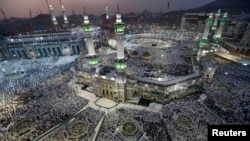As millions of Muslims begin the annual religious pilgrimage of Hajj to Mecca, several thousand West Africans will be absent after Saudi Arabia banned travelers from three Ebola-stricken nations.
Riyadh turned down visas to more than 7,000 would-be pilgrims from Guinea, Liberia, and Sierra Leone, where an outbreak of the virus has killed more than 3,000 people and infected twice as many. The ban also includes anyone who has visited those three countries recently.
The three banned countries are home to some 13.2 million Muslims.
Despite the precautions, Malaysian pilgrim Elias Ismail remains wary. One of an estimated 2 million people in Mecca on Thursday, he wore a surgical mask at the start of the five-day Hajj.
"I wear this mask because of, for my health and of course we heard of Ebola from African countries, that is why I am preventing, I am also afraid of this Ebola," said Ismail.
Nigeria, where approximately half the population is Muslim, has only had 20 Ebola cases and eight deaths in the year's outbreak. The country's pilgrims were not banned from participating in Hajj.
Dr. Manal Mansour, head of infectious disease control at Mecca's Al Nour Specialist Hospital, said the Saudi Health Ministry was cooperating with the World Health Organization and other groups to prevent contagious illnesses from spreading in the kingdom.
"The ministry of health, they are working hard trying to put all the precaution and to prevent the spread of Ebola, Insha'Allah [God willing], during especially the mass gathering period of the pilgrim or Hajj period," said Mansour.
It is not the first time Riyadh has taken drastic measures amid an Ebola scare.
When a lethal Ebola outbreak struck in 2012, Muslims from the Democratic Republic of Congo were barred from the pilgrimage.
Saudi Arabia already has health requirements for all pilgrims and seasonal workers, like the meningitis vaccine. Travelers from countries with yellow fever and polio also must prove they have been vaccinated against those diseases.
In an effort to curb the respiratory illness MERS, Saudi Arabia reissued a warning this year to would-be pilgrims with weak immune systems -- like the elderly, chronically sick, and children -- to avoid Hajj "for their own safety."
The pilgrimage concludes early next week.





